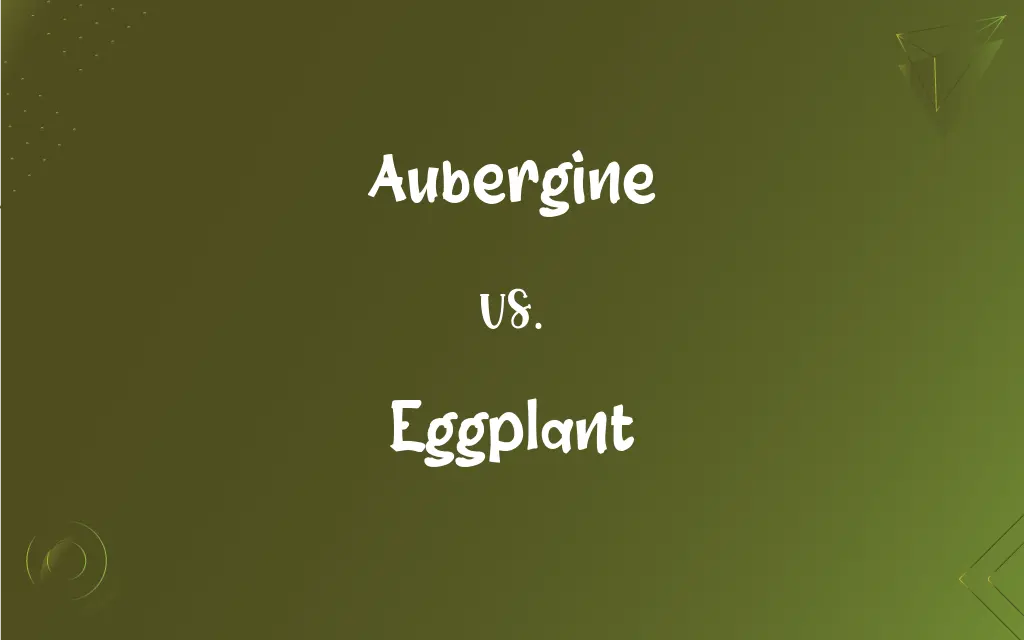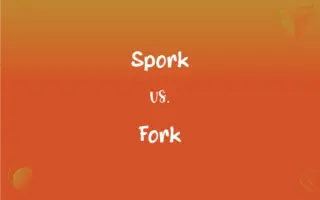Aubergine vs. Eggplant: What's the Difference?
Edited by Aimie Carlson || By Janet White || Updated on October 10, 2023
Aubergine and Eggplant refer to the same purple vegetable; "Aubergine" is British English, while "Eggplant" is American English.

Key Differences
Aubergine and Eggplant might seem like distinct terms, but they both denote the same vegetable. Aubergine is commonly used in British English to refer to the dark purple, oblong vegetable that's often included in culinary dishes. On the flip side, Eggplant is the term used in American English for the very same vegetable, recognized for its unique texture and rich flavor.
In various parts of the world, either Aubergine or Eggplant might be more recognized. For instance, if you're shopping in a London grocery store, it's more likely you'll see a sign for "Aubergine." However, if you find yourself in a supermarket in New York, "Eggplant" would be the displayed term. The terminology difference is purely linguistic and doesn't indicate any variation in the vegetable itself.
It's intriguing how languages develop multiple terms for the same item. Aubergine has its origins in the French language, a term that the British adopted. In contrast, the term "Eggplant" was coined in the United States due to some of the early cultivated varieties being white or yellow, bearing a resemblance to goose or hen's eggs.
Despite the difference in nomenclature, Aubergine and Eggplant are used similarly in cooking. Both terms refer to a vegetable that is versatile, popular in dishes like ratatouille or moussaka with Aubergine, and Eggplant parmesan or baba ganoush with Eggplant.
Comparison Chart
Linguistic Origin
French-derived term
American term
ADVERTISEMENT
Common Use
British English
American English
Color
Typically purple
Typically purple (though can be white or yellow)
Usage in Cuisine
Moussaka, ratatouille
Eggplant parmesan, baba ganoush
Vegetation Type
Solanum melongena (botanical name)
Solanum melongena (botanical name)
Aubergine and Eggplant Definitions
Aubergine
A plant of the nightshade family.
The Aubergine plant thrives in warmer climates.
ADVERTISEMENT
Eggplant
The American term for the British "Aubergine."
In the US, people commonly say Eggplant.
Aubergine
A color resembling the vegetable's shade.
Her dress was a deep Aubergine hue.
Eggplant
Popular in various cuisines worldwide.
Eggplant parmesan is a beloved Italian-American dish.
Aubergine
The British term for what Americans call "Eggplant."
In the UK, they use the term Aubergine more frequently.
Eggplant
A purple, oblong vegetable.
I need one large Eggplant for this recipe.
Aubergine
A dark purple vegetable used in cooking.
She added sliced Aubergine to the curry.
Eggplant
A member of the nightshade family.
The Eggplant is a cousin to the tomato.
Aubergine
A key ingredient in Mediterranean cuisine.
Moussaka is a dish made primarily with Aubergine.
Eggplant
A color resembling the vegetable.
He painted the wall an Eggplant shade.
Aubergine
See eggplant.
Eggplant
A plant (Solanum melongena) native to India, cultivated for its edible, glossy, usually ovoid fruits that are chiefly purple but can be white, yellow, or green.
Aubergine
(British) An Asian plant, Solanum melongena, cultivated for its edible purple, green, or white ovoid fruit; eggplant.
Eggplant
A fruit of this plant. Also called aubergine.
Aubergine
(British) The fruit of this plant, eaten as a vegetable.
Eggplant
A blackish purple.
Aubergine
(color) A dark purple colour; eggplant.
Eggplant
The plant Solanum melongena.
Aubergine
Hairy upright herb native to southeastern Asia but widely cultivated for its large glossy edible fruit commonly used as a vegetable
Eggplant
The edible fruit of the Solanum melongena: an aubergine.
Aubergine
Egg-shaped vegetable having a shiny skin typically dark purple but occasionally white or yellow
Eggplant
(North America) A dark purple color, like that of the skin of this fruit.
Eggplant
A black person (used mainly by Italian-Americans).
Eggplant
A 180 backside rotated invert in which the front hand is planted on the lip of the halfpipe wall
Eggplant
A plant (Solanum Melongena), of East Indian origin, allied to the tomato, and bearing a large, glossy, edible fruit, shaped somewhat like an egg; mad-apple. It is widely cultivated for its fruit, commonly eaten as a vegetable.
Eggplant
The fruit of the eggplant{1}.
Eggplant
Egg-shaped vegetable having a shiny skin typically dark purple but occasionally white or yellow
Eggplant
Hairy upright herb native to southeastern Asia but widely cultivated for its large glossy edible fruit commonly used as a vegetable
FAQs
Why is it called "Eggplant" in America?
Early varieties in the US resembled eggs in shape and color, leading to the name "Eggplant."
Do Aubergine and Eggplant taste the same?
Yes, they are the same vegetable and, thus, have the same taste.
Can I use the term "Eggplant" in the UK?
Yes, though "Aubergine" is more common, most people will understand "Eggplant."
Which term, Aubergine or Eggplant, is older?
"Aubergine," derived from French, predates the American term "Eggplant."
Are Aubergine and Eggplant the same?
Yes, they refer to the same vegetable; "Aubergine" is British English, and "Eggplant" is American English.
How do you cook an Aubergine?
Aubergine can be grilled, fried, roasted, or baked, among other methods.
Are there different varieties of Eggplant?
Yes, Eggplants come in various sizes, shapes, and even colors.
Do both Aubergine and Eggplant belong to the nightshade family?
Yes, they're the same vegetable and are part of the nightshade family.
Is the color "Aubergine" based on the vegetable?
Yes, "Aubergine" is a shade of dark purple, like the vegetable.
Why might a recipe call for "Aubergine" and not "Eggplant"?
The term used typically depends on the recipe's origin – British recipes often use "Aubergine."
Do Aubergines contain seeds?
Yes, Aubergines contain small, soft seeds that are edible.
Why might someone refer to an "Aubergine" shade?
"Aubergine" is a term for a deep, dark purple color, reminiscent of the vegetable.
Are there any dishes that are popular for Eggplant?
Yes, Eggplant is key in dishes like Eggplant parmesan, baba ganoush, and ratatouille.
Is Eggplant a fruit or a vegetable?
Botanically, Eggplant is a berry, so a fruit. However, in culinary terms, it's treated as a vegetable.
Is the Eggplant color always purple?
The most common Eggplant color is purple, but varieties can be white, green, or striped.
Can I substitute Aubergine for Eggplant in a recipe?
Absolutely, as they are the same vegetable.
Why is it called "Aubergine" in British English?
The term "Aubergine" is borrowed from French.
Do Aubergines have nutritional benefits?
Yes, Aubergines are a good source of vitamins, minerals, and dietary fiber.
Is the Eggplant's skin edible?
Yes, both the skin and the flesh of the Eggplant are edible.
Are Eggplants always oblong-shaped?
While often oblong, Eggplants can be round or elongated, depending on the variety.
About Author
Written by
Janet WhiteJanet White has been an esteemed writer and blogger for Difference Wiki. Holding a Master's degree in Science and Medical Journalism from the prestigious Boston University, she has consistently demonstrated her expertise and passion for her field. When she's not immersed in her work, Janet relishes her time exercising, delving into a good book, and cherishing moments with friends and family.
Edited by
Aimie CarlsonAimie Carlson, holding a master's degree in English literature, is a fervent English language enthusiast. She lends her writing talents to Difference Wiki, a prominent website that specializes in comparisons, offering readers insightful analyses that both captivate and inform.































































